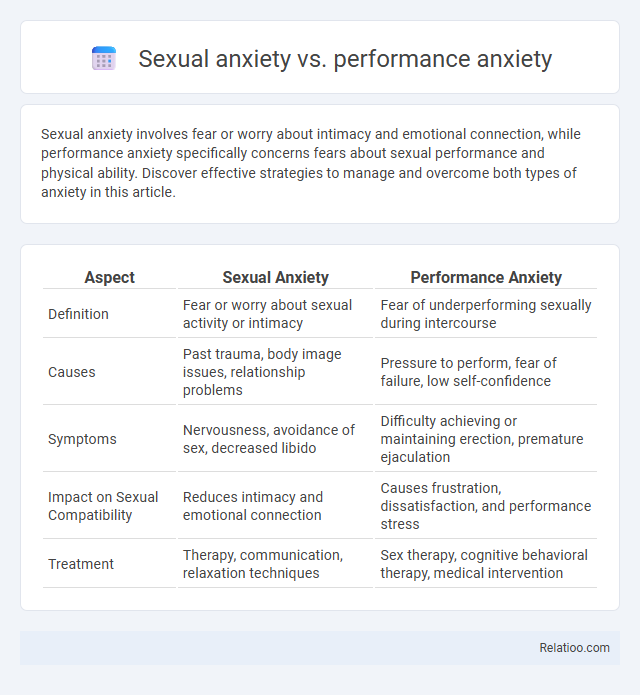Sexual anxiety involves fear or worry about intimacy and emotional connection, while performance anxiety specifically concerns fears about sexual performance and physical ability. Discover effective strategies to manage and overcome both types of anxiety in this article.
Table of Comparison
| Aspect | Sexual Anxiety | Performance Anxiety |
|---|---|---|
| Definition | Fear or worry about sexual activity or intimacy | Fear of underperforming sexually during intercourse |
| Causes | Past trauma, body image issues, relationship problems | Pressure to perform, fear of failure, low self-confidence |
| Symptoms | Nervousness, avoidance of sex, decreased libido | Difficulty achieving or maintaining erection, premature ejaculation |
| Impact on Sexual Compatibility | Reduces intimacy and emotional connection | Causes frustration, dissatisfaction, and performance stress |
| Treatment | Therapy, communication, relaxation techniques | Sex therapy, cognitive behavioral therapy, medical intervention |
Understanding Sexual Anxiety
Sexual anxiety involves fear or worry related to intimacy and sexual experiences, often rooted in emotional or psychological factors affecting desire and connection. Performance anxiety specifically refers to the stress and pressure to perform well sexually, which can impair arousal and satisfaction. Understanding your sexual anxiety requires recognizing its impact on emotional well-being and seeking strategies to reduce fear and improve communication with your partner.
Defining Performance Anxiety in Intimacy
Performance anxiety in intimacy refers to the fear or stress experienced when anticipating sexual activity, often linked to concerns about meeting expectations or achieving desired outcomes. Unlike sexual anxiety, which encompasses broader anxieties about sexuality and sexual identity, performance anxiety specifically targets the ability to perform sexually. This anxiety can cause physical symptoms like erectile dysfunction or inability to climax, negatively impacting intimate relationships and sexual satisfaction.
Key Differences Between Sexual and Performance Anxiety
Sexual anxiety specifically involves fear or worry related to sexual intimacy, such as concerns about sexual adequacy or fear of intimacy, while performance anxiety centers on the pressure to perform well in various situations, including public speaking or athletic events. Performance anxiety may encompass sexual performance but extends to non-sexual contexts, whereas sexual anxiety is confined strictly to sexual experiences. The key difference lies in the scope: sexual anxiety is a subset of performance anxiety focusing exclusively on sexual acts and related emotional responses.
Psychological Triggers of Sexual Anxiety
Sexual anxiety originates from psychological triggers such as fear of judgment, previous traumatic experiences, or unrealistic expectations about intimacy, which often escalate worry during sexual activity. Performance anxiety, a subset of sexual anxiety, specifically involves intense pressure to perform sexually, often triggered by concerns over erectile function, stamina, or pleasing a partner. Understanding these psychological factors can help you address the root causes of sexual anxiety and improve overall sexual well-being.
Common Causes of Performance Anxiety in the Bedroom
Sexual anxiety, performance anxiety, and performance anxiety in the bedroom often overlap but differ in focus and intensity, with performance anxiety specifically linked to fear of inadequacy during sexual activity. Common causes of performance anxiety in the bedroom include fear of judgment, past negative experiences, stress, and unrealistic expectations about sexual performance. Your emotional well-being and communication with your partner play a crucial role in managing these anxieties and improving your intimate experiences.
How Sexual Anxiety Manifests Physically and Emotionally
Sexual anxiety manifests physically through symptoms such as rapid heartbeat, sweating, muscle tension, and difficulty breathing, often accompanied by emotional experiences like fear, shame, and low self-esteem that inhibit sexual desire and performance. Unlike general performance anxiety, which centers on fear of judgment in various activities, sexual anxiety specifically triggers feelings of vulnerability and embarrassment related to sexual expression and intimacy. This combination of physical tension and negative emotions creates a cycle that can impair sexual functioning and satisfaction.
Effects of Performance Anxiety on Sexual Relationships
Performance anxiety can significantly impact sexual relationships by causing difficulty in maintaining arousal, leading to decreased sexual satisfaction for both partners. This anxiety often results in lowered self-esteem and communication barriers, which can strain intimacy and emotional connection. Understanding how your performance anxiety affects your sexual dynamics is crucial for seeking appropriate support and improving relationship quality.
Overcoming Sexual Anxiety: Evidence-Based Strategies
Sexual anxiety often stems from fears about intimacy or past trauma, while performance anxiety primarily relates to concerns over sexual functioning or physical performance during encounters. Overcoming sexual anxiety involves evidence-based strategies such as cognitive-behavioral therapy (CBT), mindfulness techniques, and open communication with partners, all aimed at reducing stress and improving emotional connection. By addressing these issues directly, you can build confidence and enhance your overall sexual well-being.
Managing Performance Anxiety: Helpful Techniques
Sexual anxiety and performance anxiety are related but distinct conditions that impact Your intimate experiences differently; sexual anxiety involves generalized fears about sexual activity, while performance anxiety specifically stems from worries about sexual performance. Managing performance anxiety effectively involves techniques such as deep breathing exercises, mindfulness meditation, and cognitive-behavioral strategies to reframe negative thoughts and reduce stress. Practicing relaxation methods and focusing on intimacy rather than outcomes can significantly improve confidence and enhance sexual satisfaction.
Seeking Professional Help for Sexual and Performance Anxiety
Seeking professional help for sexual anxiety and performance anxiety involves consulting licensed therapists or counselors specializing in sexual health and anxiety disorders. Cognitive-behavioral therapy (CBT) and sex therapy are evidence-based approaches that effectively address underlying psychological factors contributing to both sexual anxiety and performance anxiety. Early intervention with trained mental health professionals enhances treatment outcomes and supports improved sexual functioning and overall well-being.

Infographic: Sexual anxiety vs performance anxiety
 relatioo.com
relatioo.com